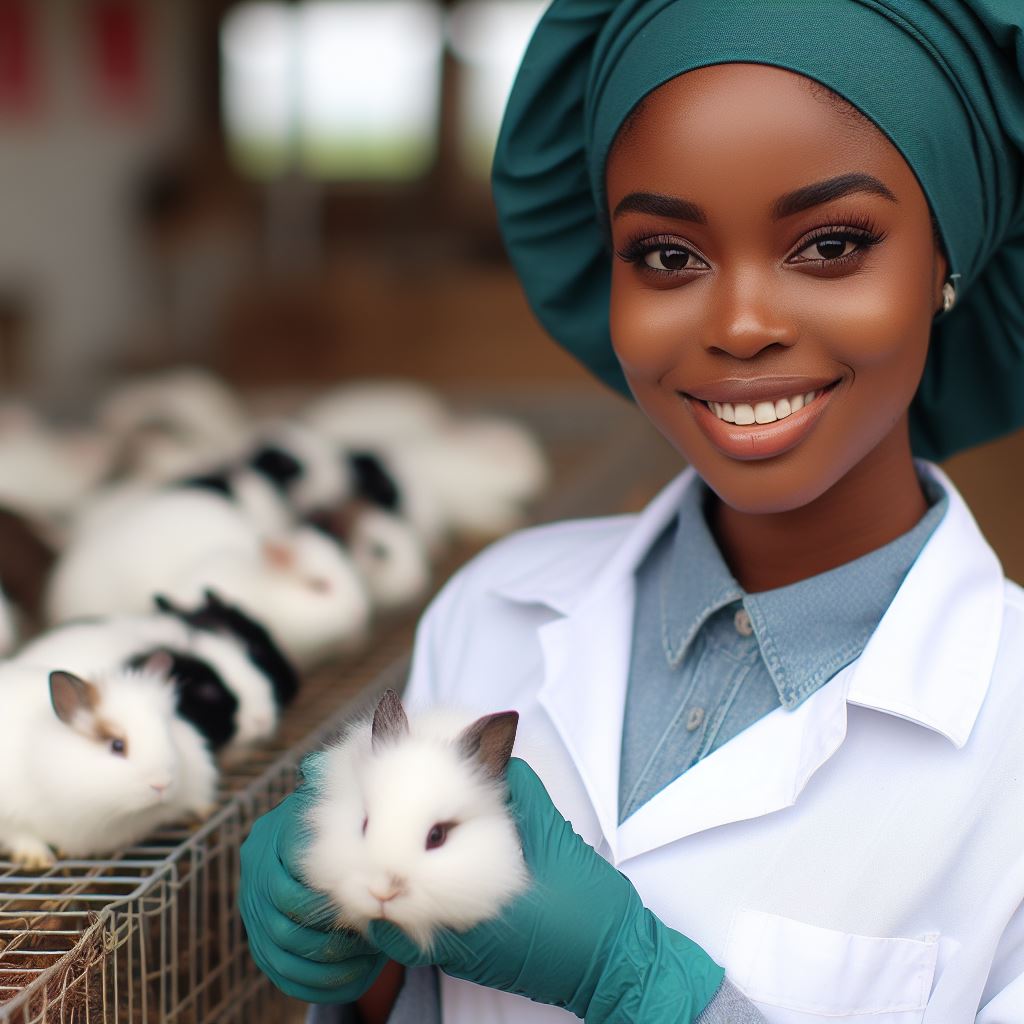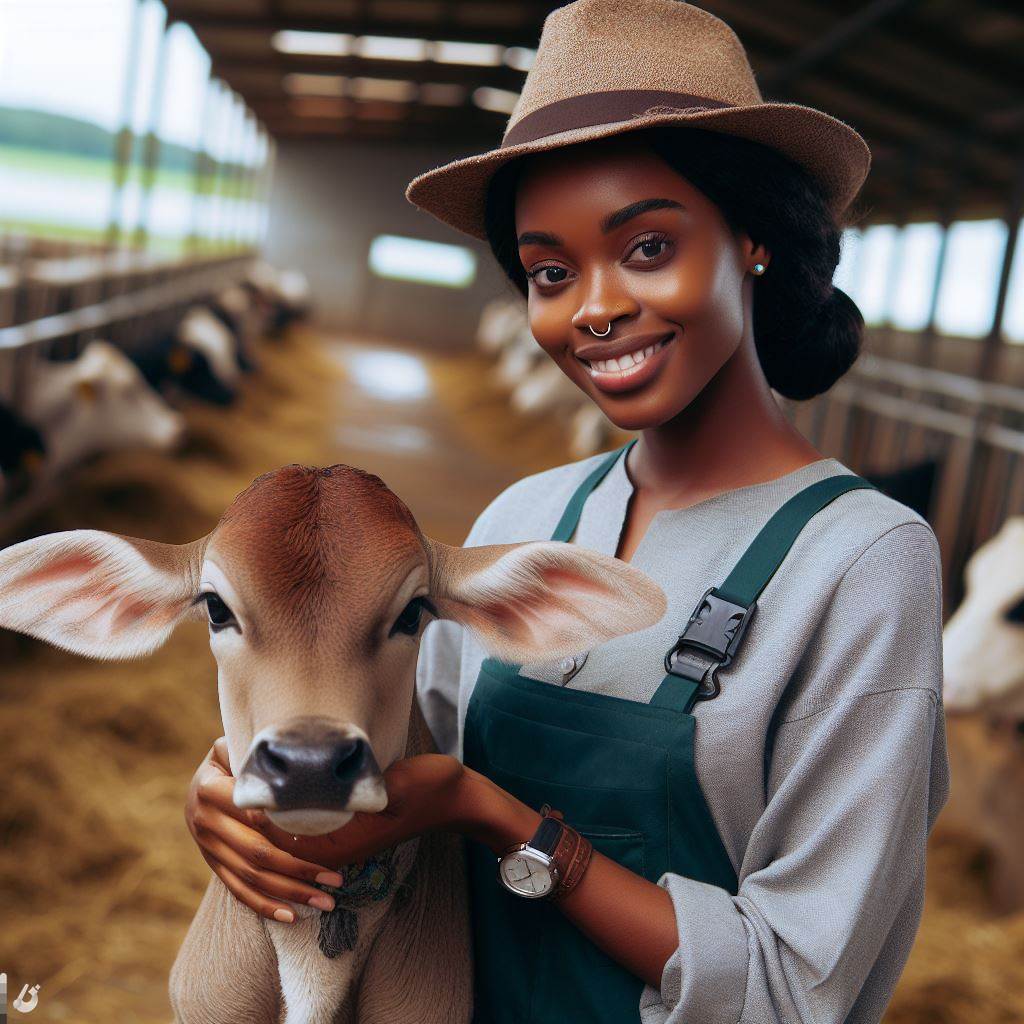Introduction
Animal genetics research aims to unravel the mysteries of genetic variations in various animal species.
By studying the genetic makeup and inheritance patterns, researchers can better understand the traits and characteristics of different animals.
This research helps in improving animal health, breeding, and overall productivity.
Innovations in animal genetics research have immense significance.
They lead to the development of advanced techniques and tools for genetic analysis and manipulation.
These innovations help breeders and farmers in selectively breeding animals for desirable traits, such as disease resistance, higher yield, and improved quality of meat or milk.
Nigeria has emerged as a key player in animal genetics research.
The country recognizes the importance of preserving and enhancing its genetic resources.
Nigerian researchers and scientists are actively involved in genetic studies of various livestock species, including cattle, poultry, and fish.
They collaborate with international institutions to exchange knowledge and resources, contributing to the global advancements in animal genetics research.
Nigeria’s role in animal genetics research holds great potential.
The country’s diverse wildlife and domestic animal diversity provide ample opportunities for studying genetic variations.
Nigerian scientists are also developing genomic tools and databases specific to local animal breeds, enabling precise breeding and genetic improvement programs.
In essence, animal genetics research plays a crucial role in understanding and manipulating genetic variations in animals.
Innovations in this field have a significant impact on animal health and productivity.
Nigeria’s active participation in animal genetics research highlights its commitment to exploring and harnessing the potential of genetic advancements for its livestock industry.
Historical Overview of Animal Genetics Research in Nigeria
This blog section provides a historical overview of animal genetics research in Nigeria, focusing on early developments and milestones, the contribution of Nigerian scientists and institutions, and the challenges faced in the past.
Early developments and milestones
In the early days of animal genetics research in Nigeria, efforts were focused on understanding the genetic makeup of local breeds.
Scientists conducted studies to identify the genetic traits and characteristics that made Nigerian livestock valuable.
This research helped in the preservation and improvement of native breeds.
Early milestones included the establishment of research institutes dedicated to animal genetics and breeding.
These institutes laid the foundation for further advancements in the field.
Contribution of Nigerian scientists and institutions
Nigerian scientists have made significant contributions to animal genetics research.
They have conducted groundbreaking studies on the genetic diversity and population structure of Nigerian livestock.
Nigerian research institutions have collaborated with international organizations to exchange knowledge and expertise.
These collaborations have accelerated the progress of animal genetics research in Nigeria.
The efforts of Nigerian scientists and institutions have led to the development of improved breeding strategies and the identification of desirable genetic traits.
Challenges faced in the past
In the past, animal genetics research in Nigeria faced several challenges.
Funding constraints limited the scope of research and hindered the acquisition of advanced technologies.
Lack of awareness among policymakers and the general public about the significance of animal genetics research posed obstacles.
Inadequate infrastructure and limited access to genetic resources impeded progress.
Additionally, the brain drain phenomenon resulted in a loss of talented researchers.
In fact, the historical overview of animal genetics research in Nigeria reveals early developments and milestones, the contribution of Nigerian scientists and institutions, as well as the challenges faced in the past.
Despite these challenges, Nigerian scientists have made significant strides in understanding and improving the genetic makeup of indigenous livestock breeds.
The collaboration with international organizations has further enriched the research landscape.
It is essential to address the funding constraints, raise awareness, improve infrastructure, and retain local talent to ensure sustained progress and innovation in the field of animal genetics research in Nigeria.
Read: Student Reviews: Pursuing Animal Physiology in Nigerian Universities
Current Innovations in Animal Genetics Research in Nigeria
Recent breakthroughs and advancements
Nigeria has witnessed significant advancements in animal genetics research in recent years.
Scientists have made breakthroughs in breeding strategies to enhance livestock productivity and disease resistance.
Genomic technologies have been applied to identify genes responsible for desirable traits in animals.
Transform Your Career with Expert Guidance
Get personalized mentorship consulting that’s tailored to your unique path. Our expert advice is actionable and exclusive.
Get StartedThe use of artificial insemination and embryo transfer techniques has improved breeding efficiency.
Research has focused on developing new DNA markers for genetic selection and improving animal health.
Key research projects and initiatives
The National Animal Genetic Resources Center and Data Bank (NAGRC&DB) is leading research efforts in Nigeria.
The center collaborates with universities, research institutions, and international partners to accelerate genetic research.
The Africa Breeders Services Total Cattle Management (ABS-TCM) project aims to improve cattle genetics and investment in Nigeria.
The Nigerian Institute of Animal Science (NIAS) carries out research on animal genetics and provides advisory services.
Initiatives such as the Nigerian Livestock Transformation Initiative (NLTI) support genetic improvements in livestock.
Notable Nigerian scientists and their contributions
Professor Mohammed Baba at the University of Ilorin has conducted extensive research on animal genetics.
His work has led to the development of new breeding strategies for improved cattle production.
Dr. Funmilayo Okanlawon at the Nigerian Institute of Animal Science has contributed to the identification of genetic markers for disease resistance in poultry.
Her findings have helped reduce the impact of diseases on poultry farms.
Dr. Adekunle Adeniji at the National Animal Genetic Resources Center has played a crucial role in implementing genomic technologies for cattle breeding.
In short, Nigeria has made remarkable progress in animal genetics research, with breakthroughs in breeding strategies, genomic technologies, and reproductive techniques.
The country is undertaking key research projects and initiatives to further enhance livestock genetics and productivity.
Notable Nigerian scientists are actively contributing to advancements in animal genetics, improving disease resistance, and identifying genetic markers.
These developments hold great promise for the agricultural sector and contribute to sustainable livestock production in Nigeria.
Read: Renowned Animal Physiologists from Nigeria and Their Contributions
Application of Animal Genetics Research in Nigeria
Enhancing livestock breeding programs
Animal genetics research has opened up vast opportunities for Nigeria’s livestock breeding programs.
Through the use of advanced genetic technologies, researchers can select superior animals for breeding.
This helps improve the overall quality of livestock and increases productivity.
Livestock breeders can now identify animals with desired traits, such as high meat yield or milk production.
Through selective breeding, farmers can enhance genetic traits and produce superior offspring.
This results in improved breeds that are more resilient to environmental factors and disease.
Animal genetics research also enables breeders to optimize crossbreeding programs.
By combining the genetic strengths of different breeds, farmers can create hybrids with improved characteristics.
For example, crossing a high milk-producing cow with a disease-resistant bull enhances both traits in the offspring.
Improving animal health and disease resistance
Animal genetics research plays a crucial role in improving animal health and resistance to diseases in Nigeria.
Scientists can identify genetic markers associated with disease resistance and susceptibility.
This allows breeders to selectively breed animals with higher resistance to common diseases.
Through genetic testing, farmers can identify carriers of genetic diseases and avoid breeding them.
This helps reduce the prevalence of inherited diseases within livestock populations.
By focusing on breeding animals with higher disease resistance, farmers can significantly improve herd health.
Genetic research also aids in the development of vaccines and treatments for livestock diseases.
Scientists can study the genetic makeup of animals to better understand disease mechanisms.
This knowledge can lead to the development of targeted interventions, reducing disease outbreaks and improving animal welfare.
Sustainable agriculture and food security
Animal genetics research has important implications for sustainable agriculture and food security in Nigeria.
By enhancing the genetic potential of livestock, researchers contribute to increased food production.
Improving traits like meat yield and milk production ensures a stable supply of animal-based products.
Genetically superior animals require fewer resources, such as feed and medication.
This leads to more efficient livestock production, reducing the environmental impact of agriculture.
By optimizing breeding programs, farmers can increase productivity while minimizing the strain on resources.
Animal genetics research also promotes biodiversity conservation in agriculture.
Through the preservation of indigenous livestock breeds, researchers maintain genetic diversity.
This is essential for adapting to future challenges such as climate change, pests, and disease outbreaks.
In general, the application of animal genetics research in Nigeria has transformative effects on livestock breeding, animal health, and sustainable agriculture.
By enhancing breeding programs, improving disease resistance, and ensuring food security, Nigeria can harness the benefits of animal genetics research to drive its agricultural sector forward.
Read: The Role of Animal Physiology in Nigeria’s Biodiversity Conservation

Collaboration and Partnerships in Animal Genetics Research in Nigeria
International collaborations and joint projects
Nigeria has established partnerships with international organizations for animal genetics research.
These collaborations contribute to the exchange of knowledge and expertise in the field.
Joint projects allow for shared resources and funding, enhancing research capabilities.
International collaborations help Nigerian researchers stay abreast of global advancements in animal genetics research.
They also provide opportunities for Nigerian researchers to contribute to global research efforts.
Collaboration and partnerships are essential for the advancements of animal genetics research in Nigeria.
International collaborations and joint projects facilitate access to global expertise, resources, and funding.
This enables Nigerian researchers to contribute significantly to the field and stay up to date with international advancements.
Role of government agencies and research institutions
Nigeria’s government agencies play a crucial role in supporting animal genetics research.
They provide funding and resources to research institutions working in this field.
Government support enables researchers to conduct extensive research and experiments.
Research institutions collaborate with government agencies to align their research goals with national development objectives.
This collaboration ensures that research outcomes have practical implications for Nigeria’s animal agriculture sector.
The role of government agencies and research institutions is crucial in supporting animal genetics research.
Their funding and resources enable researchers to conduct extensive studies and align their research objectives with national development goals.
This ensures that research outcomes have practical implications for Nigeria’s animal agriculture sector.
The importance of knowledge sharing and exchange
Knowledge sharing is integral to the progress of animal genetics research in Nigeria.
Researchers regularly participate in conferences, seminars, and workshops to share their findings.
These platforms allow for the dissemination of research outcomes and insights to a broader audience.
Researchers from different institutions collaborate to exchange ideas and expertise.
Knowledge exchange fosters a collaborative environment and promotes innovation in the field.
Knowledge sharing and exchange play a vital role in the progress of animal genetics research.
Through conferences, seminars, and workshops, researchers share their findings with a wide audience.
Collaboration between researchers from different institutions promotes the exchange of ideas and expertise, fostering a collaborative environment that drives innovation in the field.
In review, collaboration and partnerships are integral to the success of animal genetics research in Nigeria.
By harnessing international collaborations, leveraging government support, and encouraging knowledge sharing, Nigerian researchers can make significant contributions to the field and drive advancements in animal genetics research.
Read: Innovations in Teaching Animal Physiology in Nigerian Institutions
Challenges and Opportunities in Animal Genetics Research in Nigeria
Limited funding and resources
- The shortage of funding for animal genetics research in Nigeria poses a major challenge.
- The lack of financial resources hinders the implementation of advanced technologies and infrastructure.
- Insufficient funding also limits the ability to conduct extensive studies and experiments.
- The scarcity of resources affects the overall efficiency and progress of animal genetics research.
- Budget constraints restrict the acquisition of modern equipment and state-of-the-art facilities.
Capacity building and training needs
- Nigeria faces a shortage of skilled professionals in the field of animal genetics research.
- Training programs and educational opportunities need to be enhanced to build expertise.
- Efforts should be made to attract talented researchers and scientists to contribute to this field.
- Establishment of specialized training institutes and workshops can address knowledge gaps.
- Collaboration with international institutions can facilitate knowledge transfer and skill development.
Potential for economic and societal impact
- Advancements in animal genetics research can lead to significant economic benefits for Nigeria.
- Breeding programs based on genetic improvement can result in higher quality livestock.
- Increase in agricultural productivity can contribute to food security and rural development.
- Better understanding of animal genetics can lead to the prevention and control of diseases.
- Identification of disease-resistant genes can reduce livestock mortality and improve farmer income.
The potential societal impact of animal genetics research is equally significant
- Improved animal health and welfare can contribute to sustainable farming practices.
- The development of disease-resistant breeds can reduce the reliance on antibiotics and chemicals.
- Enhanced knowledge about animal genetics can promote conservation and biodiversity efforts.
- Creation of employment opportunities in the field of animal genetics can boost the economy.
- Strengthening the livestock sector can contribute to poverty reduction and improve living conditions.
In a nutshell, animal genetics research in Nigeria faces challenges related to limited funding and resources as well as a need for capacity building and training.
However, the potential for economic and societal impact provides opportunities for growth and development.
By addressing these challenges and leveraging the available opportunities, Nigeria can make significant progress in the field of animal genetics research, leading to improved livestock quality, food security, and overall societal well-being.
Conclusion
Recap of the Nigeria’s contributions and advancements
Nigeria has made significant contributions and advancements in animal genetics research.
The country has invested in research infrastructure and established collaborations with international institutions.
Researchers in Nigeria have successfully developed improved animal breeds through selective breeding programs, resulting in increased productivity and disease resistance.
Importance of further investment and support in animal genetics research
Given the potential of animal genetics research to address food security, climate change, and economic sustainability, it is essential to continue investing in and supporting this field.
Further investment in research facilities, training programs, and collaborations will enable Nigeria to stay at the forefront of animal genetics research and reap the benefits it brings.
Potential future developments and advancements
Looking ahead, Nigeria has the potential for further developments and advancements in animal genetics research.
Genetic engineering techniques could be explored to introduce desirable traits in animals.
The application of genomic technologies, such as next-generation sequencing, can also provide valuable insights into animal traits, diseases, and breeding patterns.
Increased efforts in conserving indigenous animal breeds and preserving genetic diversity will be crucial for long-term sustainability.
Nigeria has made remarkable strides in animal genetics research, but continued investment and support are necessary to unlock the full potential of this field.




